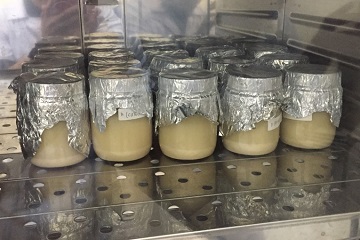IPB’s Researchers Used Bacteria from Dangke for Fermented Milk Production

Dangke is a traditional dairy processed product of uncured cheese made hereditary in Enrekang District, South Sulawesi Province. The cheese production process can produce whey as a by-product of cheese/dangke manufacture. Whey is a residual liquid produced after the separation of the curd (cheese lump) from the cheese making process. As much as 80-90 percent of the milk volume is whey and contains about 55 percent of the total nutrient of milk. Whey is not widely used and often disposed of as waste. Consequently, whey has a high potential in causing environmental pollution.
The development of easy and inexpensive whey management in utilizing the nutritional properties of whey is necessary to increase the economic value of whey and can appeal to the dairy industry.
Therefore, three researchers from the Department of Animal Production and Technology, Faculty of Animal Husbandry, Bogor Agricultural University (Fapet IPB), Epi Taufik, Irma Isnafia Arief and Setiawan Putra Syah, tried to develop fermented whey beverage products by utilizing bacteria originated from dangke.
"Dangke naturally contains indigenous lactic acid bacteria (BAL indigenous). BAL indigenous was isolated from dangke to obtain BAL culture which can be used as starter (microbial culture) for making fermented whey beverage. In this research, BAL indigenous isolation from dangke has been done and has been molecularly characterized, "Setiawan said.
He added that the fermentation process with lactic acid bacteria will yield fermented whey products with high nutritional value and also distinctive taste. Health functions in whey fermentation products include: producing antimicrobial compounds (against bad bacteria), lowering cholesterol, preventing "lactose intolerance" (milk allergy), balancing the microbial population in the intestine (probiotics), and having antioxidant and antitumor activity.
Based on the results of this experiment, the team managed to find five selected bacterial isolates. "The 16S rRNA gene was successfully amplified (obtained) in the five selected isolates (isolates A323L, B111K, B323K, C113L, and C222L). The molecular identification results showed that all five isolates were Lactobacillus fermentum having a similarity index of 98.8 – 100 percent with some L. fermentum isolates from various countries, "he said.
The production of fermented whey beverage can be done easily. Whey waste from dangke/cheese production was collected in containers. Whey was then heated and added by 8 percent sucrose while stirring for five minutes at 70 degrees Celsius. Whey was then sterilized by increasing the temperature of heating to 115 degrees Celsius for 15 minutes. Whey was cooled and inoculated by 3 percent (v/v) of BAL culture starter of probiotic candidate from dangke with 108 cfu/ml bacterial concentration, then incubated at 37 degrees Celsius for 12 hours.
The probiotic ability of BAL used in the production of fermented whey beverage has been tested, so it can be classified as BAL probiotic candidate. Based on the research results conducted by this team, BAL indigenous from dangke L. fermentum B111K has been proven to reduce cholesterol on media containing 100 μg/ml of cholesterol. L. fermentum B111K can lower cholesterol by 4.10 percent. Another capability needed by BAL probiotic candidate is the ability to stick to the intestinal wall when entering the gastrointestinal tract.
"Application of utilizing five isolates of BAL probiotics candidate from dangke (L. fermentum) can be a technological innovation in the production of "fermented whey" health beverage as an effort to utilize whey waste generated from dangke/cheese production. Health beverage production "fermented whey" using BAL probiotic candidate of dangke isolate is expected to be a solution in the whey waste utilization and can be an additional income for dangke/cheese industry, "he said. (TK)



